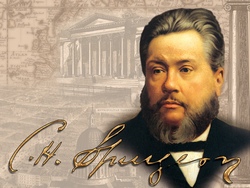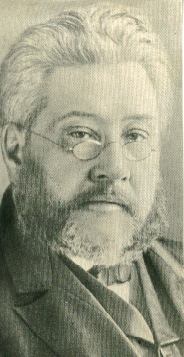Charles Spurgeon
The Blind Eye & The Deaf Ear (Part 5)
In the case of false reports against yourself, for the most part use the deaf ear.
Unfortunately liars are not yet extinct, and, like Richard Baxter and John Bunyan, you may be accused of crimes which your soul abhors. Be not staggered thereby, for this trial has befallen the very best of men, and even your Lord did not escape the envenomed tongue of falsehood. In almost all cases it is the wisest course to let such things die a natural death. A great lie, if unnoticed, is like a big fish out of water, it dashes and plunges and beats itself to death in a short time.
Discussion
The Blind Eye and the Deaf Ear (Part 3)
This post continues a lecture from C.H. Spurgeon’s Lectures to My Students (read the series so far).
Avoid with your whole soul that spirit of suspicion which sours some men’s lives, and
to all things from which you might harshly draw an unkind inference turn a blind eye and a deaf ear.
Suspicion makes a man a torment to himself and a spy towards others. Once begin to suspect, and causes for distrust will multiply around you, and your very suspiciousness will create the major part of them. Many a friend has been transformed into an enemy by being suspected. Do not, therefore, look about you with the eyes of mistrust, nor listen as an eaves-dropper with the quick ear of fear. To go about the congregation ferreting out disaffection, like a gamekeeper after rabbits, is a mean employment, and is generally rewarded most sorrowfully.
Discussion
Why Was Spurgeon So Successful?
Some time ago I was given the then-new volume of “missing sermons” of C.H. Spurgeon published by Day One Publishers. C.H. Spurgeon has always been be my “preaching hero,” and I have read far more of his sermons than those of everyone else combined. His autobiography shaped me like nothing else in the early days of my ministry. We who are Calvinists often claim that his success was due to his Puritan Calvinism. In the 1990’s I argued in an unpublished paper that it was Spurgeon’s plain speech, not just his Calvinism, that made him so successful. Here is an excerpt from that paper.
What fails in the theological interpretation of Spurgeon is its inability to explain how many other English preachers who had held as tenaciously to Calvinistic tenets as Spurgeon did were not nearly as successful as he was! Furthermore, it fails to explain the tremendous appeal of preachers like his contemporaries Joseph Parker in London and Russell Conwell in Philadelphia—who were not Calvinists! What Spurgeon brought to the pulpit, along with an effective evangelical Calvinism, was a populism born out of his own personal experience. One of the ways in which this was manifested was his commitment to plain speech.
Discussion
C. H. Spurgeon - Sermon for New Year's Day
 Special thanks to The Spurgeon Archive. Spurgeon delivered this message on Thursday evening, January 1, 1885 at the Metropolitan Tabernacle, Newington.
Special thanks to The Spurgeon Archive. Spurgeon delivered this message on Thursday evening, January 1, 1885 at the Metropolitan Tabernacle, Newington.
“And he that sat upon the throne said, Behold, I make all things new.”—Revelation 21:5.
Discussion
The Incarnation and Birth of Christ - C. H. Spurgeon
 Delivered Sunday Morning, December 23rd, 1855, by the Rev. C.H. Spurgeon at New Park Street Chapel, Southwark.
Delivered Sunday Morning, December 23rd, 1855, by the Rev. C.H. Spurgeon at New Park Street Chapel, Southwark.
“But thou, Beth-lehem Ephratah, though thou be little among the thousands of Judah, yet out of thee shall he come forth unto me that is to be ruler in Israel; whose goings forth have been from of old, from everlasting” (Micah 5:2).




Discussion